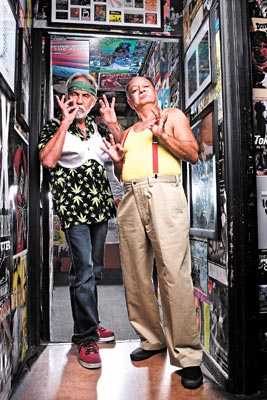The Straight Dope

Hey, man. It’s not just about the dope.
Granted, there’s a huge smoke screen surrounding Cheech & Chong, whose surprising reunion quickly sold out two shows Saturday at the Palms.
But Cheech Marin has not a trace of laughter in his voice when he says, "Cheech & Chong has a lot of depth. People always say, ‘It’s just sophomoric dope jokes.’ But Cheech & Chong have levels of understanding that only become apparent when you see it a number of times. When you realize that, you really realize the depth of what we’re saying and what we’re doing."
If you’re not buying that, maybe you will reconsider if Marin pulls off his dream to create a Cheech & Chong stage show and "have it play in Vegas instead of on Broadway." It would be "the story of how we got together, which is a wonderful story. I think that would work really well in Vegas."
For now, though, a lot of fans will settle for the sophomoric dope jokes. It has been 27 years since Sister Mary Elephant, Sgt. Stedanko, Tyrone Shoelaces and of course Dave (who’s not here), existed anywhere but late-night cable or old vinyl LPs moldering in the garage.
Those who came of age with the duo in the ’70s never thought they would live to see Marin, 62, and Chong, 70, settle old scores and get together again. "Neither did I," says Marin, who jokes that they could have called the "Light Up America" tour the "felimony tour" instead: "His felony and my alimony."
Chong might still be paying down expenses from the high-profile prosecution of his water-pipe business, which sent him to federal prison in late 2003. But even before then, Chong always seemed to play The Who’s eager Roger Daltrey to Marin’s reluctant Pete Townshend, the power resting in the hands of the partner with more options.
While Marin turned up everywhere from Disney animation to a Sam Shepard play — he is currently heard in "Beverly Hills Chihuahua" — Chong took his familiar persona to "That ’70s Show."
"I’m like an old blues musician. You teach me a certain couple of tunes and that’s all I know," Chong noted in 2000 before a solo date at a locals casino. By then, he thought his former partner had a "whole different outlook on everything. He actually blames me, like it was my fault for making him do all the stoner stuff."
But now, Marin says the two came to "appreciate each other and realize how unique our partnership is."
"We finally came to the conclusion that each of us possessed half of a treasure map. You could only find the treasure if you put the two halves together," he says. They realized, "If we’re ever going to do something, we have to do it now. And the live shows seemed to be the thing we probably argued least about."
Going on the road also was "something we could go do right away," as opposed to a movie or cable special. "It’s immediate, and it has real harsh rules: If they don’t laugh, it’s not funny."
Parsing through their old material, the two discovered the musical routines hold up the best, from the radio hit "Basketball Jones" to Marin’s rambling "Mexican Americans," the closest the duo got to social commentary.
"It’s almost like doing standards," Marin says. "It’s amazing, they don’t have a time or place. They seem just as significant and meaningful now as they did in the day. And it shocks me."
From their debut album in 1971 through 1984’s ill-advised final movie, "Cheech & Chong’s The Corsican Brothers," the two built upon their core characters of a hippy-era Laurel and Hardy: the excitable Cheech prone to manic mood swings, balanced by the unflappable Chong facing each of life’s challenges with the same easy-going, heavy-lidded stupor.
"Those characters are so alive and so part of us," Marin says. "They come from us so much it has a truthfulness about it that’s just undeniable. Those characters come from inside our souls."
In 1977, the two made monthly visits to Las Vegas to perform at the Aladdin at 2:30 a.m. Three years before that, they sold out two shows in a Flamingo convention hall. The Strip was then more accustomed to comedians such as Buddy Hackett, Alan King or Johnny Carson, but Marin says that by then he already knew what Hollywood soon would discover, when "Up in Smoke" became a top-grossing movie of 1978.
"We were considered so counterculture and underground and all that, and we never thought we were," he says. "We always projected we were middle-of-the-road dopers and that was the norm. We are the normal people. The normal people in America look like us. And everybody used to laugh (at that notion). But we would go from city to city all over the country, and this is what we would see."
Las Vegas will have another chance to reassess the Cheech & Chong legacy when the duo submit themselves to a celebrity roast next month for The Comedy Festival at Caesars Palace.
Marin hopes that, plus the reunion tour selling out in an awful economy, should help sell his idea for the theatrical show on the Strip.
Las Vegas should be "ready to premiere stuff there instead of Broadway. If it isn’t us (who can do it), who is it?"
Contact reporter Mike Weatherford at mweatherford@reviewjournal.com or 702-383-0288.